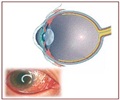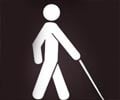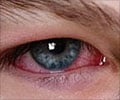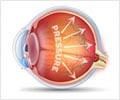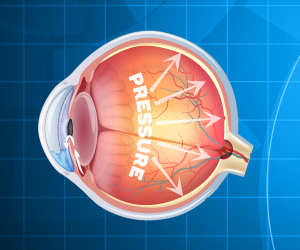Q: Which doctor should I consult for glaucoma?
A: You should consult an ophthalmologist (eye doctor).
Q: Can glaucoma be cured?
A: There is no cure for glaucoma. The damage to the optic nerve and retinal nerve fibers as well as vision impairment is permanent. Treatment aims at halting further damage and preserving the remaining vision. That is why early diagnosis and treatment is vital.
Q: I have sustained a blunt injury to my eye. The doctor tells me that even though my eye is fine now, there is a risk for glaucoma in future. Is this true?
A: Patients who sustain blunt trauma sometimes have damage near the angle of the anterior chamber referred to as angle recession. Some of these patients develop what is called as angle recession glaucoma many years later. So if you have angle recession, you need to undergo annual checkups with your eye doctor.
Q: I forget to put my eye drops on some days. Is that ok?
A: No, it is not. One of the common causes for progression of glaucomatous damage and eventual blindness is non-compliance on the part of the patient. You will have to stick to the time. Keep reminders if necessary.
Q: I am on regular anti-glaucoma eye drops. When I visit my doctor for follow up, should I skip the eye drops on that day?
A: No. The doctor needs to assess the efficacy of the medication, and that is possible only if you use your eye drops up to the visit to the doctor. Also, if your eye drops get over just a few days before your appointment, DO buy another bottle and continue using the eye drops till your visit.
Q: I am regularly using eye drops for primary open angle glaucoma. Now the doctor says I have a cataract and require surgery. Do I need to continue my glaucoma medication after the cataract surgery?
A: That depends on what type of surgery is performed by your doctor. If you undergo only a cataract surgery then you will have to continue your glaucoma medications after surgery. However, if you undergo a combined cataract and glaucoma surgery, then you may be able to skip the glaucoma medications. The decision as to the type of surgery will be taken by your doctor after careful consideration and discussion with you.
Q: If I am diagnosed with glaucoma, can I still drive?
A: That will depend on the degree of glaucomatous damage that you have. Your doctor will let you know after checking your vision and visual field. Decreased contrast sensitivity and diminished dark adaptation may make driving at night difficult in some people, even if day time driving is not a problem.
Q: I have been using eye drops for glaucoma for the past 2 months, but I am not able to notice any change in my eyes. Do I really need to continue my medication?
A: Anti-glaucoma drugs control intraocular pressure and prevent further ocular damage. If you have good control, then there will be no further deterioration of vision due to glaucoma. Vision that is lost cannot be retrieved. That is why you have not noticed any change. Failure to continue medication will DEFINITELY lead to progressive damage to the eye and consequent blindness and is not recommended.
Q: What is 100 day glaucoma?
A: Patients who have had an obstruction in the central vein of the retina are at increased risk of developing glaucoma due to formation of abnormal new vessels (neovascular glaucoma). It is so named since this occurs roughly 3 months after the vein occlusion.
Q: I have arthritis in my fingers and I’m having trouble putting the eye drops every day. This is especially bothersome since I am using 3 different glaucoma medications. Is there any way out?
A: If using glaucoma medications is becoming problematic, you should discuss this with your doctor, so that if found suitable, he can perform a laser procedure (laser trabeculoplasty) or one of the various glaucoma surgeries to reduce your dependency on eye drops.
Q: My eye is blind from glaucoma. Recently it has become painful. Why is this?
A: This is the stage of absolute glaucoma. It is the end stage of any uncontrolled glaucoma. The eye is very painful. You may have to undergo a surgical procedure wherein either a drainage implant is placed, or the ciliary body is destroyed so that aqueous is no longer produced such as cyclophotocoagulation (destruction of ciliary body by laser) or cyclocryotherapy (destruction of ciliary body by application of extreme cold temperature). If a surgical procedure is not desired, absolute alcohol can be injected behind the eye to destroy the nerves that are causing the pain.
Q: Recently my intraocular pressure was checked as a part of a routine eye examination, and was found to be high. Will I develop glaucoma?
A: Not necessarily. Optic disc and visual field changes do not occur in all patients with a raised intraocular pressure. Such a condition is referred to as ocular hypertension. You will have to have regular checkups with your eye doctor to make sure you are not developing glaucoma. However if you have a family history of glaucoma or other risk factors for primary open angle glaucoma, or if the intraocular pressure is very high (> 30 mm Hg), then the doctor might want to start glaucoma medication right away.
Q: I went for a routine eye checkup because I am diabetic. The doctor said dilating my eye could precipitate glaucoma and recommended a laser procedure first. Why is this?
A: If on examination, the doctor finds that the angle of the anterior chamber in your eye is narrow, he will recommend a laser iridotomy (making an opening in the iris with a laser), because otherwise dilatation of the pupil in such cases may trigger an attack of acute angle closure. Once laser iridotomy is performed, it is safe to dilate the pupil.
Q: I have been following water therapy for some time. Can I continue to do so after a diagnosis of glaucoma?
A: No. Water therapy involves drinking a large quantity of water on an empty stomach in the morning. In fact this is one of the provocative tests for glaucoma, even though it is no longer used. Ingestion of a large quantity (half to one liter) in a very short period of time can result in a significant rise in intraocular pressure, and hence you should stop this water therapy immediately.
Q: Can I continue with my yoga after being diagnosed with glaucoma?
A: Certain yoga positions such as those with a head down position have been shown to result in a profound increase in intraocular pressure and should be avoided by those with glaucoma. The positions to be avoided are shirshasana or headstand, adho mukha svanasana or downward facing dog, uttanasana or standing forward bend, halasana or plow, and viparita karani or legs up the wall.
Q: Should there be any change in my exercise routine after a diagnosis of glaucoma?
A: Aerobic exercise is beneficial and physical fitness is associated with lower intraocular pressures. Exercise is also beneficial for keeping blood pressure under control, which again is beneficial for glaucoma patients. However, lifting weights and head down yoga positions should not be done. Playing wind instruments also increases intraocular pressure.
Q: Can I drink coffee and consume alcohol if I have glaucoma?
A: Both should be consumed only in moderation.
Q: Can having cataract surgery cause glaucoma?
A: Temporary rises in intraocular pressure are common after a cataract surgery and can be brought under control by short term use of anti- glaucoma medication. Rarely, a sudden rise of intraocular pressure can occur due to a blockage of the drainage angle by a swollen ciliary body or blockage of the pupil. These can be reversed by appropriate timely medical or laser intervention. Long term use of corticosteroid eye drops after cataract surgery can result in steroid-induced glaucoma. Glaucoma is much more common after infant cataract surgery.
Q: Do cataracts lead to glaucoma?
A: A cataract in which the lens is swollen can cause secondary angle closure glaucoma. Hypermature cataracts with liquefied cortex can result in a type of secondary open angle glaucoma referred to as phacolytic glaucoma. In both of these conditions the intraocular pressure increases to very high levels, and the eyes become red and painful.
Q: I have heard that marijuana can reduce intraocular pressure and is approved for glaucoma treatment. Is it advisable?
A: No. Though marijuana is known to reduce intraocular pressure, its duration of action is very short, and so has to be taken multiple times per day; this can result in cannabis use disorder. There are better drugs with better safety profiles for glaucoma treatment.




